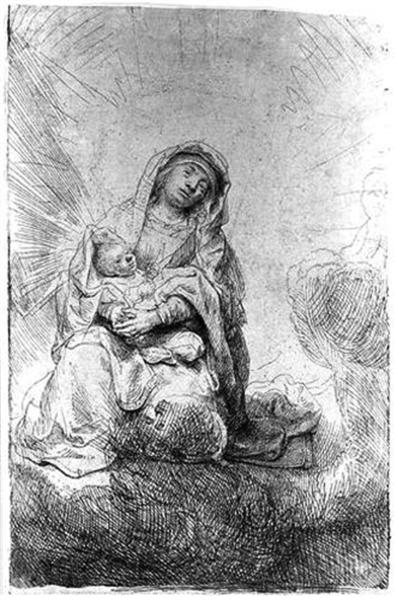Descriere
Rembrandt’s painting “Madonna and Child in the Clouds,” created in 1641, is a work that encapsulates the essence of the artist’s spirituality and technical mastery during his mature years. Part of the Baroque religious art tradition, this painting offers an intimate and heavenly depiction of the Virgin Mary holding the Christ Child, an element that resonates with deep theological and emotional meanings.
Compositionally, the work exhibits a balanced structure, with the central figure of the Virgin and Child situated in the middle of the canvas, gracefully emerging from a background of ethereal clouds. This use of negative space around the central figures allows the viewer’s gaze to be immediately drawn to the faces of Mary and Child, who display expressions of tenderness and serenity. The tilt of Mary’s head, which seems to look lovingly and protectively towards her son, is subtly contrasted by the posture of the Child, who in turn seems to look curiously towards the viewer. This interaction creates an emotional bond that transcends the physical space of the painting.
The colour palette used by Rembrandt in this work is remarkable. Gold and grey tones predominate, evoking a heavenly yet earthly atmosphere. The soft lights that illuminate the figures contrast with the darker background, contributing to the feeling of depth and volume. The artist's mastery in the use of chiaroscuro—a technique that he perfected and that became one of his hallmarks—is evident here. Light and shadow are used not only to shape the figures, but also to instil a sense of spirituality that seems to surround the Virgin and Child as if they were enveloped in a divine aura.
The characters, though simple in their depiction, are charged with meaning. The Virgin is depicted as a loving mother, her gentle, serene face conveying an unwavering peace. The Infant Jesus, on the other hand, is painted with a palpable innocence that provokes in the viewer a mixture of reverence and tenderness. This emphasis on the mother-child relationship not only brings a sense of humanity to the divine representation, but also establishes a parallel with maternal love that transcends cultural and temporal contexts.
Within the context of 17th century art, this painting is situated in the tradition of religious painting that proposes a dialogue between the divine and the human. The interpretation of the Virgin and Child is a recurring theme in Rembrandt's work and a parallel can be drawn with other works of his such as “The Holy Family” and “The Standing Lady”, where the use of chiaroscuro and the focus on emotion are equally central.
An interesting aspect of "Madonna and Child in the Clouds" is the use of natural elements, represented here by clouds, which symbolize both the celestial and protection and transcendence. The clouds, treated in an almost pictorial way, not only frame the scene but also act as an intermediary between earth and sky, a resource that Rembrandt employs to rescue the sacred character of the representation.
In conclusion, “Madonna and Child in the Clouds” is a celebration of the duality of the divine and the human, framed in an atmosphere of light and shadow that invites deep contemplation. Rembrandt’s ability to capture the essence of his subjects, along with his technical mastery, makes this work an emblematic example of his contribution to Baroque art, where we see not only a representation of religious figures, but an exploration of the human soul in its relationship with the divine. Through this painting, the viewer is transported to a space of introspection and connection, reflecting the perennial search for meaning in spiritual experience and maternal love.
KUADROS ©, a famous painting on your wall.
Hand-made oil painting reproductions, with the quality of professional artists and the distinctive seal of KUADROS ©.
Painting reproduction service with satisfaction guarantee. If you are not completely satisfied with the replica of your painting, we will refund 100% of your money.

